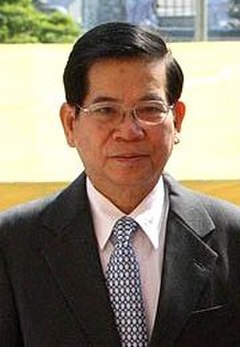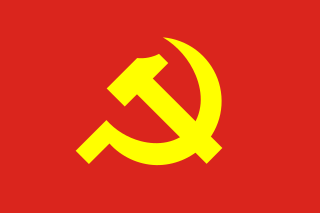
The politics of Vietnam are defined by a single-party socialist republic framework, where the General Secretary of the Communist Party of Vietnam is the Party leader and head of the Politburo, holding the highest position in the one-party system. The President of Vietnam is the head of state, and the Prime Minister of Vietnam is the head of government in a one-party system led by the Communist Party of Vietnam. Executive power is exercised by the government and the President of Vietnam. Legislative power is vested in the National Assembly of Vietnam. The Judiciary is independent of the executive. The parliament adopted the current Constitution of Vietnam, its fifth, on 28 November 2013.

Nguyễn Chấn, known as Trần Văn Trà was a Vietnamese general. He was a commander in the Vietcong; a member of the Central Committee of the Lao Dong Party from 1960 to 1982; a lieutenant general in the army of the North Vietnam; chairman of Military Affairs Committee of the Central Office of South Vietnam (COSVN) (1964–1976).

The Communist Party of Vietnam (CPV) is the founding and ruling communist party of the Socialist Republic of Vietnam. Although it nominally exists alongside the Vietnamese Fatherland Front, it maintains a unitary government and has centralised control over the state, military and media. The supremacy of the Communist Party is guaranteed by Article 4 of the national constitution. CPV was founded in 1930; since 1954, it has been the ruling party of North Vietnam and then the Socialist Republic in 1976 after seizing power in South Vietnam. It controls the Vietnam People's Armed Forces.

Đỗ Mười was a Vietnamese communist politician. He rose in the party hierarchy in the late 1940s, became Chairman of the Council of Ministers in 1988 and was elected General Secretary of the Central Committee of the Communist Party of Vietnam (CPV) at the 7th Congress in 1991. He continued his predecessor's policy of ruling through a collective leadership and Nguyễn Văn Linh's policy of economic reform. He was elected for two terms as General Secretary, but left office in 1997 at the 3rd plenum of the 8th Central Committee during his second term.

Lê Đức Anh was a Vietnamese politician and general who served as the fourth President of Vietnam from 1992 to 1997. He previously led the Vietnamese forces in Cambodia throughout the 1980s. He was regarded as a conservative who advocated maintaining tight party control over domestic policies.

Nguyễn Minh Triết is a Vietnamese politician who served as the sixth President of Vietnam from 2006 to 2011. He was elected by the National Assembly of Vietnam with 464 votes (94%) in June 2006.

Nguyễn Phú Trọng is a Vietnamese politician who has been the General Secretary of the Communist Party of Vietnam, the highest position in Vietnam since 2011. In addition, Trọng served as president of Vietnam from 2018 to 2021. As general secretary, Trọng heads the party's secretariat and is the Secretary of the Central Military Commission in addition to being the de facto head of the politburo, the highest decision-making body in Vietnam, which currently makes him the most powerful person in Vietnam.

The General Secretary of the Central Committee of the Communist Party of Vietnam, known as First Secretary from 1951 to 1976, is the highest office within the Communist Party of Vietnam and typically the supreme leader of Vietnam. The General Secretaryship was the second-highest office within the party when Hồ Chí Minh was Chairman, a post which existed from 1951 to 1969. The general secretary is also the Secretary of the Central Military Commission, the leading Party organ on military affairs. For a period in its history, the position of general secretary has been synonymous with the paramount leader of Vietnam. The current general secretary is Nguyễn Phú Trọng, and he is ranked first in the Politburo.

The Chairman of the National Assembly of Vietnam, formerly the Chairman of the Standing Committee of the National Assembly of Vietnam from 1946 to 1981, is the legislative speaker of Vietnam, presiding over the National Assembly. The National Assembly is, in the words of the constitution, "the highest representative organ of the people; the highest organ of state power".

The Political Bureau (Politburo) of the Central Committee Communist Party of Vietnam, formerly the Standing Committee of the Central Committee from 1930 to 1951, is the highest body of the Communist Party of Vietnam (CPV) between Central Committee meetings, which are held at least twice a year. According to Party rules, the Politburo directs the general orientation of the government and enacts policies which have been approved by either the National Party Congress or the Central Committee.

The Central Committee of the Communist Party of Vietnam established 1930, is the highest authority within the Communist Party of Vietnam elected by the Party National Congresses. The current Central Committee has about 180 full members and 20 alternate members and elects the Politburo of the Communist Party of Vietnam.

Trương Tấn Sang is a Vietnamese politician, who served as the seventh President of Vietnam from 2011 to 2016. He was one of Vietnam's top leaders, alongside prime minister Nguyễn Tấn Dũng and Party general secretary Nguyễn Phú Trọng. In July 2011, Trương Tấn Sang was elected state president of the Socialist Republic of Vietnam by the National Assembly of Vietnam and nominated by his predecessor Nguyễn Minh Triết who retired from office.

The Central Military Commission (CMC), is the highest party organ in Vietnam on military policy. Its membership includes some members of the Politburo and military leaders. The CMC is headed by the current General Secretary of the Communist Party of Vietnam, Nguyễn Phú Trọng.

Nguyễn Xuân Phúc is a Vietnamese politician currently serving as the President of Vietnam, one of the highest-ranked officials in Vietnam along with Nguyễn Phú Trọng, General Secretary of the Communist Party of Vietnam. Phúc ranked 2nd in the Communist Party's 13th Politburo behind Nguyễn Phú Trọng and was ranked 3rd in the 12th Politburo. Nguyễn Xuân Phúc is also a full member of the National Assembly, serving in its 11th, 12th, 13th and 14th terms. He was elected to the post by the National Assembly of Vietnam on 5 April 2021 after serving 5 years as Prime Minister of the country. Nguyễn Xuân Phúc became a member of the Communist Party of Vietnam on 12 November 1983.

The Central Theoretical Council of the Central Committee of the Communist Party of Vietnam was established on 22 October 1996 by a decision of the Central Committee, and is responsible for conceiving and developing the party's Marxist theoretical standpoint. It is responsible to the Politburo and the Secretariat in between sessions of the Central Committee and the party's National Congress.

The Organization Commission of the Central Committee of the Communist Party of Vietnam, formerly the Central Organization Department from 1930–1951, is an advisory body to the Central Committee, and directly subordinate to the Politburo. It is one of the most important institutions within the Vietnamese political system since its main responsibility is to nominate and approve the appointment of officials throughout the country. All former heads have been members of the Politburo and the Secretariat while in office.

The Central Mass Mobilization Department of the Central Committee of the Communist Party of Vietnam is an advisory body to the Central Committee, and directly subordinate to the Politburo. It is chiefly responsible for public security and public relations.

Trần Quốc Vượng is a Vietnamese politician. He was a member of the Politburo of the Communist Party of Vietnam, Standing member of the CPV Central Committee’s Secretariat, Former Deputy Head of Central Steering Committee on Anti-corruption, Member of the National Assembly of Vietnam. He has worked in many units and agencies of the Communist Party of Vietnam and Socialist Republic of Vietnam, serving as Chairman of the Central Inspection Commission of the Communist Party of Vietnam; Head of Central Office of the Communist Party of Vietnam, Secretary of the Party Personnel Committee, Prosecutor General of the Supreme People's Procuracy of Vietnam.











